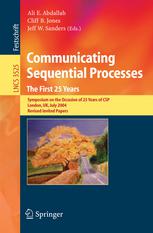

Most ebook files are in PDF format, so you can easily read them using various software such as Foxit Reader or directly on the Google Chrome browser.
Some ebook files are released by publishers in other formats such as .awz, .mobi, .epub, .fb2, etc. You may need to install specific software to read these formats on mobile/PC, such as Calibre.
Please read the tutorial at this link: https://ebookbell.com/faq
We offer FREE conversion to the popular formats you request; however, this may take some time. Therefore, right after payment, please email us, and we will try to provide the service as quickly as possible.
For some exceptional file formats or broken links (if any), please refrain from opening any disputes. Instead, email us first, and we will try to assist within a maximum of 6 hours.
EbookBell Team

4.1
70 reviewsThis volume, like the symposium CSP25 which gave rise to it, commemorates the semi-jubilee of Communicating Sequential Processes. 1 Tony Hoare’s paper “Communicating Sequential Processes” is today widely regarded as one of the most in?uential papers in computer science. To comm- orate it, an event was organized under the auspices of BCS-FACS (the British Computer Society’s Formal Aspects of Computing Science specialist group). CSP25 was one of a series of such events organized to highlight the use of formal methods, emphasize their relevance to modern computing and promote their wider application. BCS-FACS is proud that Tony Hoare presented his original ideas on CSP at one of its ?rst meetings, in 1978. The two-day event, 7–8 July 2004, was hosted by London South Bank U- versity’s Institute for Computing Research, Faculty of Business, Computing and Information Management. The intention was to celebrate, re?ect upon and look beyondthe?rstquarter-centuryofCSP’scontributionstocomputerscience. The meeting examined the impact of CSP on many areas stretching from semantics (mathematical models for understanding concurrency and communications) and logic(forreasoningaboutbehavior),throughthedesignofparallelprogramming languages (i/o, parallelism, synchronization and threads) to applications va- ing from distributed software and parallel computing to information security, Web services and concurrent hardware circuits. It included a panel discussion with panelists Brookes, Hoare, de Roever and Roscoe (chaired by Je? Sanders), poster presentations by PhD students and others, featured a ?re alarm (requ- ing evacuation in the rain!) and concluded with the presentation of a fountain pen to Prof. Sir C. A. R. Hoare.